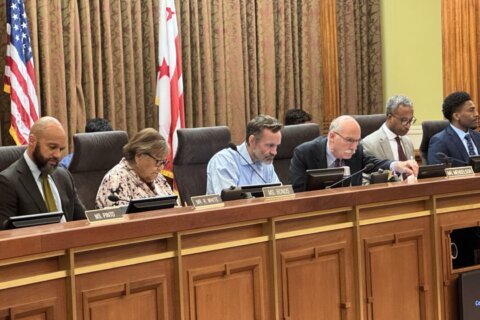Virginia ranks slightly higher than Maryland in a study of overall well-being of children, with Virginia taking the seventh spot among states in education.
The 2024 Kids Count Data Book assigns state-by-state ratings for five children’s well-being categories: Overall, economic well-being, education, health, as well as family and community.
Overall, Virginia ranked 16 in the nation, with Maryland at 22. D.C. was not included in the overall rankings, but indicators from each category were included in the report’s appendices.
Nationally, the 35th edition of the study by the Annie E. Casey Foundation, said the latest data from the National Assessment of Educational Progress showed that between 2019 and 2022, fourth-grade reading and eighth-grade math scores plummeted, representing decades of lost progress.
Virginia’s education was seventh in the country, while Maryland was rated 22nd.
Breaking the education indicators down by state, 68% of Virginia fourth graders were not proficient in reading in 2022. In the D.C., 74% were not reading proficiently in fourth grade.
In eighth grade math, 69% of Virginia students, 75% of Maryland students, and 84% of D.C. were not proficient.
In the economic well-being category, Virginia ranked 17, immediately followed by Maryland at 18. The indicators include the percentage of children in poverty, where Maryland stood at 12%, Virginia at 13% and D.C. at 17%. The category also includes children whose parents lack secure employment, high housing cost burden, and teens not in school and not working.
Nationally, some positive trends emerged. Parents’ economic security improved significantly, with 62.4% of children living in economically secure homes in 2022, compared to 58.4% in 2021. The child poverty rate decreased from 17.2% in 2021 to 15.9% in 2022, returning to pre-pandemic levels.
In the health category, Virginia ranked 23rd in the nation, with Maryland at 27th. While not included in the ranking, in the number of child and teen deaths per 100,000, D.C. had 54, Virginia 30 and Maryland 28.
Only 1% of children in D.C. don’t have health insurance — 4% of children don’t have health insurance in Virginia and Maryland.
In the family and community category, Virginia ranked 17th and Maryland 21st.
Looking at the category’s indicators, the percentage of children living in high poverty areas was 18% in D.C., 4% in Virginia, and 3% in Maryland. Teen births per 1,000 were 11 in Virginia and Maryland, and 12 in D.C.
The percentage of children in single-parent families was 49% in D.C., 33% in Maryland, and 32% in Virginia.
Suggested solutions
According to the report, research supports that what kids need in order to thrive are permanent relationships with caring adults; access to essentials such as food, mental and physical health care; and stable housing.
Among the suggestions are “prioritizing access to mental health care that accounts for young people’s different experiences and identities.” As well, as school systems focusing on reversing chronic absenteeism.
The Casey Foundation report recommends “a culture of pursuing evidence-based solutions, testing different methods and sustaining efforts over multiple years,” as well as an emphasis on teacher recruitment and retention.
For students who are behind in their classes and missing academic milestones, the report said “access to intensive tutoring is important.”
The report said an important funding source is about to retire. “By Sept. 20, 2024, states must draw down funding from the $190 billion federal Elementary and Secondary School Emergency Relief (ESSER) program authorized by several pandemic-era relief bills.”
While more than $44 billion remained unspent in April 2024, the report said some states have launched tutoring programs, including Maryland, which has developed math-specific tutoring corps.
According to the study’s authors, “COVID-19 laid bare the many ways our nation has not positioned children to achieve.”
“We must do more to help kids overcome the setbacks that affect their learning. This moment brings not only an opportunity but an imperative to do better. The future of millions of young people and the enduring strength of the American economy are at stake.”
Get breaking news and daily headlines delivered to your email inbox by signing up here.
© 2024 WTOP. All Rights Reserved. This website is not intended for users located within the European Economic Area.








